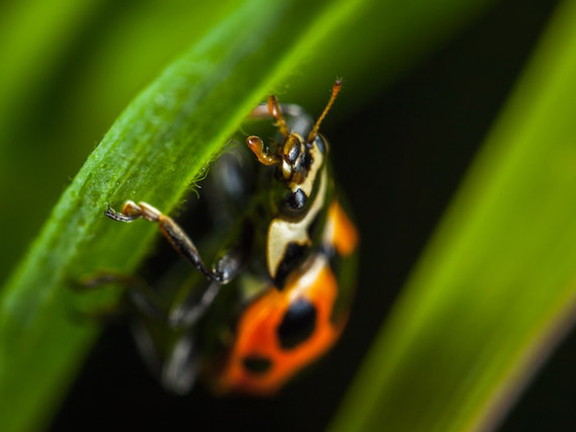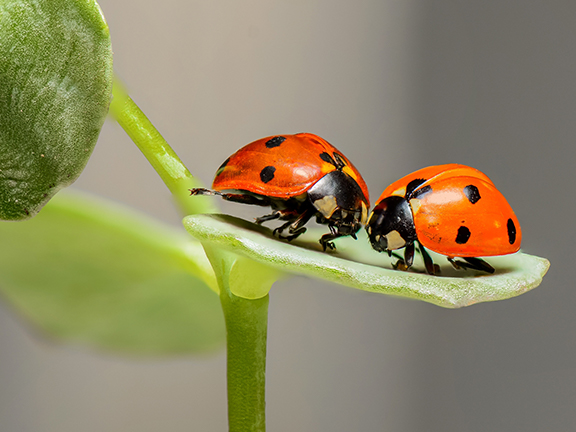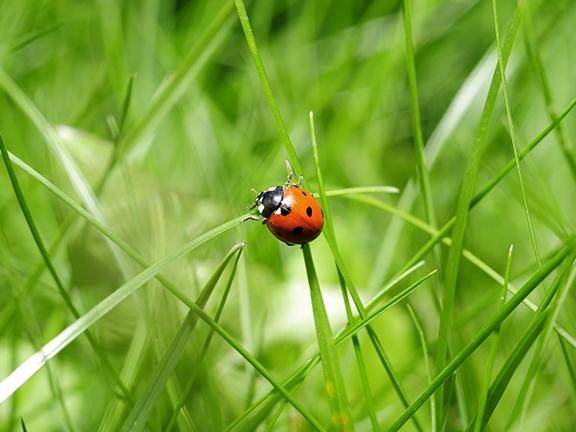Create Your Own Ladybug
About the Activity
Create your own lucky beetle with some simple art supplies!
Did you know ladybugs are considered symbols of good luck? That’s right, this beautiful beetle earned its praise in Europe for fighting off other plant-eating pests. Learn to create your own ladybug, so you always have a little bit of luck on hand.

Materials
These simple art supplies are all you’ll need to create your own lucky ladybug. You may need to make a trip to an art store for some supplies:
Black paper plate
Red paper plate
1-2 black pipe cleaners
Brad nail
Black construction paper
White construction paper
Cup (approx 3” wide mouth)
Scissors
Permanent black marker
Hole puncher
Glue
2 small googly eyes (Optional)
Activity Steps
In this activity you will learn about ladybugs and make your own.
The first step is to prepare your plates. Punch a hole in your black plate about a half-inch from the edge.

Now grab your red plate, and cut it in half. Take your two halves of the red plate, and hold them as if you are going to put the plate back together. Now, slightly rotate one of them, so the inside top of one side overlaps with the other. You’ve just created wings for your lady bug.
 Did you know?
Did you know?Not all ladybugs are ladies. They can be either female or male. It is difficult to determine the sex of a ladybug, but females tend to be larger than males.
Punch a hole through the two red plates where they overlap, about a half-inch from the edge. Line up the holes in the red plates over the hole in the black plate, and use your brad nail to attach them.
 Did you know?
Did you know?Ladybugs go through a life cycle of four stages: egg, larva, pupa, and adult. It takes 4-8 weeks for a ladybug to mature from an egg to an adult. An adult ladybug will live for about 1 year.
Now, take your cup and place it upside down on top of the black construction paper, and trace the cup sized circle. Cut out the circle. This will be your lady bug’s head.
 Did you know?
Did you know?While it may look like this paper ladybug doesn’t have a mouth, that’s actually far from the truth. One single ladybug can eat up to 5,000 insects in its lifetime. They also look for pollen as a food source. Flowers and herbs such as cilantro, dill, fennel, caraway, yarrow, tansy, angelica, scented geraniums, coreopsis, and cosmos are good choices for luring ladybugs to your yard.
Next, it’s time to make the antennas! Using a pen, a tack, or something pointy, poke two small holes in the circle about ¼-inch from the edge. You may want to ask an adult for help. Cut two pieces of pipe cleaner, each 3-inches long. Thread one piece through each hole in the paper, and bend the end back to help keep it in place. If it’s easier, you could also glue the pipe cleaner pieces to the top of the head.
If you choose to use googly eyes, you can glue them on to the lady bug’s head. If you don’t have googly eyes, you can cut out two small circles from the construction paper to glue on to the head.
The final step is to decorate your lady bug. Use a permanent marker and color spots for the ladybug.
 Did you know?
Did you know?A ladybug’s color actually helps to protect it. The markings on a ladybug communicate to predators that they taste terrible and should eat something else. Depending on the species, they can have spots, stripes, or no markings at all and come in many colors.
Test Your Knowledge
See how much you learned about ladybugs.
Reflection Questions
Questions for your kids and teens.
What are some ways that lady bugs could help farmers to keep pests away?
What purpose does the color of a ladybug serve in nature?
Why are ladybugs considered lucky in some cultures?
Investigate and Explore

Take what you’ve learned to the next level to learn more and explore the possibilities.
You may have heard that if a ladybug lands on you, it’s a sign of good luck. Why is that? Before they were considered ladybugs, these insects were actually called “Beetle of Our Lady.” They were given their name by European farmers who struggled with pests eating their crops. They prayed to the Virgin Mary for help, and when the beautiful red beetles arrived and wiped out the invading insects, the farmers named them after their savior. The beetles had answered their prayers. Eventually, the name was shortened to “ladybug.”
So while many people now enjoy lady bugs because of the beauty and luck they bring, farmers actually appreciate them because they eat aphids, mites, scales, thrips, white flies, and other plant-eating pests.




